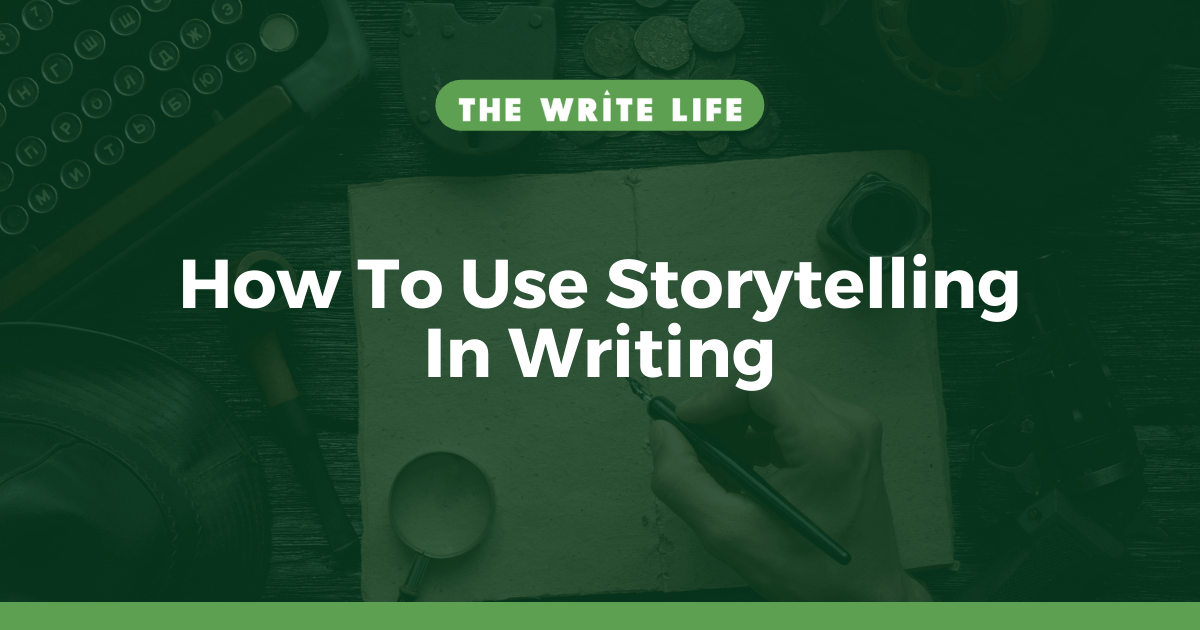You might have heard how important storytelling is when it comes to content and writing in general.
No matter what type of writing you are doing, learning how to use storytelling to your advantage can help your work stand out and draw in readers.
If you don’t know how to use storytelling in writing, thankfully there are some tips you can use to bring your writing to life, even if you are not doing creative writing.
Throughout this article we will break down the fundamentals of storytelling, why all writers should learn the essentials, and then dive into some tactical things you can use in your writing.
What Is Storytelling?
Storytelling is the art of using a story to convey a message and to draw readers in and give them a reason to be emotionally involved in your writing.
Storytelling is the social and cultural activity of sharing stories, sometimes with improvisation, theatrics or embellishment. Every culture has its own stories or narratives, which are shared as a means of entertainment, education, cultural preservation or instilling moral values.
From Wikipedia
Once you know the core elements of storytelling, you can start to use those tactics in everything you write to make it more engaging and interesting.
Most of us think of fiction writing when it comes to storytelling, but you can use it in almost any kind of writing. Even if you do not write fiction, it can be good to practice storytelling as a way to draw more attention to your writing and level up as a writer in general.
Why Is Storytelling Important?
For the most part, humans remember and become more attached to stories than almost anything else. There is a reason we love reading books, watching movies, and telling stories at social gatherings. It is because we love that stories do to us.
For example, we can hear statistics and data about events in the world, but we connect to it and remember things more when storytelling is involved. It is why you can remember stories you heard and can repeat them better than you can recall facts you learned in school.
When we talk to people in our lives, we share stories and it is how we relate to each other.
If you want to be a writer, no matter what writing niche you pick, knowing how to use storytelling to your advantage can help grow your career in ways you never planned.
Why Storytelling Matters In Blogging
If you want your blog to stand out and start to hook readers, you will need to use elements of storytelling to grab attention.
It is one of the best ways to build a following and create content that people want to share. Not enough blogs utilize storytelling in their posts, so it is a great tool to use to stand out between so many competitors.
Including a story is also a way for your reader to really understand and visualize what you are trying to say and understand your message in a way that they would not otherwise.
Benefits Of Using Storytelling
Storytelling is a great way to grab people’s attention and keep it hooked.
There is something uniquely human about the love of stories and our desire to always keep them in our lives, even if it is
You will often find that you can increase engagement as well when you use stories. People love to comment and engage on particular stories.
Think about the creator behind Humans Of New York who simply walked around New York (and eventually then multiple places in the world) where he would ask people to share their stories. It captivated people around the world and garnered a lot of attention.
Storytelling gives people a reason to share content, too, as it is more interesting than a blog that is just about a particular topic.
How To Use Storytelling In Writing
Now that we have covered the basics of why storytelling matters and what it is, now is the time to dive into the tactical things you can use to start bringing more stories into your writing.
Determine your main story
In almost any story, there is a beginning, a middle, and an end. If you want to use storytelling in your writing, you need at least those three main points of your story outlined so you know what to include.
That makes it incredibly simplified, but it is the best place to start if you are new to telling stories.
Give people a reason to care
First, you will need to think about who you are telling the story, the purpose of the story in the first place, and how those two go together.
Sure, you can write a story for the sake of sharing a story, but often you will have a particular reason to share a certain story and a certain person you want to read it.
This is especially true if you are blogging or doing any kind of writing for marketing or branding purposes.
It might seem tedious to spend the amount of time thinking about the reader and what they need out of your writing, but it will be worth it.
Keep some storytelling basics in mind
There are some things you will and will not want to include in your writing.
For example, take out cold, boring language. This is particularly common with businesses that use storytelling, where they rely on a ton of jargon and business-speak and avoid getting into the flow of telling a story.
You will also want to highlight sensations and the senses when it comes to writing a story, since that is what makes them so visual. You will want to talk about how things smell, taste, look, feel, sound, and so on. It can draw them in and help them put themselves in a position to feel the story.
Write the story as if you were telling it to someone you were with. That is a great way to write a story in a natural way.
Continue to practice
One of the main things you need to keep in mind is that you will need to practice over and over in order to be a good storyteller.
It is also why most authors, screenwriters, and anyone else who is in a creative career can take years to perfect their craft and become excellent storytellers.
What to Do Next
If you need some help when it comes to outlining your fiction book, you do not want to miss out on the Fiction Writer’s Handbook!
It has a great tutorial for everything you need to know when it comes to putting your book together and making sure you do not miss out on some essentials.











